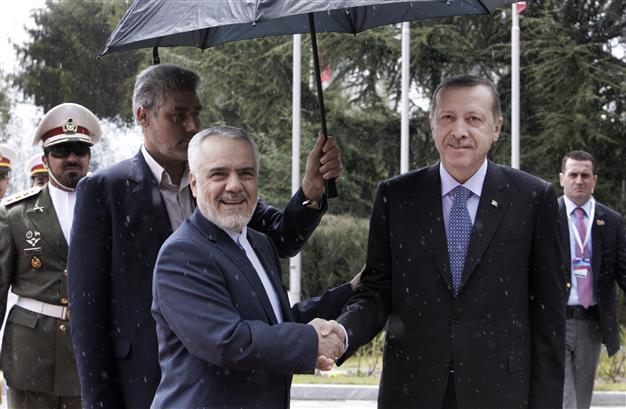Iran shows ire over Turkey's stand on Syria, sanctions
TEHRAN - Agence France-Presse

Turkish Prime Minister, Recep Tayyip Erdogan, right, is welcomed by Iranian Vice-President Mohammad Reza Rahimi, during an official welcoming ceremony in Tehran, Iran, Wednesday, March 28, 2012. AP photo
Iran's about-face on Turkey hosting its nuclear talks with world powers reveals Tehran's growing irritation with Ankara's policies seen as increasingly anti-Iranian, analysts and diplomats say.Several Iranian officials announced on Wednesday that Baghdad or Beijing could hold the meeting due April 13 and 14, instead of Istanbul which was initially proposed by Tehran.
While Iran's foreign ministry kept vague about the issue, several Iranian politicians justified the shift by Turkey's support for the opposition in Iran's main regional ally Syria.
"Turkey is now excluded," Aladin Borujerdi, the head of the Iranian parliament's foreign affairs commission, told the Iranian channel Al-Alam.
"Taking into account the extremist and illogical position of Turkey on Syria... Turkey has de facto lost any competence to host the meeting," he said.
Turkey has, for the past two years, acted as an intermediary between Iran and world powers on the nuclear issue. But its position on Syria has been poisoning bilateral relations for several months now.
Tehran little appreciated comments by Turkish Deputy Prime Minister Bulent Arinc, who in February lambasted Iran's silence over the repression in Syria by questioning whether the Islamic republic was "worthy of being called Islamic." But Iran's leaders seem particularly irked by an international "Friends of Syria" conference held in Istanbul last week that supported regime change in Damascus as a way of ending a year-long uprising that has cost more than 9,000 lives according to the United Nations.
Such was the criticism from Tehran that Ankara on Wednesday summoned the Iranian ambassador to protest formally.
"The main challenge in the relations between Iran and Turkey is Syria," underlined on Thursday the Iranian newspaper Tehran Emrouz, seen as close to the ruling circles.
The view was underlined by Irannuc.ir, a website also close to Iranian authorities that regularly defends Tehran's atomic programme.
"Turkey's bias and animosity towards Syria are the principal reason" for Istanbul being dropped as the preferred venue for the nuclear talks, it said.
But there are other reasons for the chill creeping over ties between the neighbouring countries.
Last week, Turkey's chief oil company announced it was cutting Iranian oil imports by 20 percent, falling into line with Western sanctions.
According to Iranian economic officials, some Turkish banks have also started to distance themselves from Iran, particularly when it comes to processing oil payment transactions.
Turkey, additionally, has since the beginning of the year tightened up visa restrictions on visiting Iranians, notably tourists and students, several corroborating sources said.
Tabnak, a conservative website in Iran, on Thursday blasted "Turkey's anti-Iranian efforts and progressive alignment with Western sanctions." It also lashed out at Turkey's policy in Iraq that is seen as hostile to Baghdad's Shiite-dominated government.
Further, several European diplomats in Tehran say, Iran remains irritated by Turkey's agreement to install parts of a NATO anti-missile shield on its territory.
That system, aimed at defending Europe from Iranian missiles, created a sharply-worded dispute last November between the two countries.
A similar anti-missile system the United States is promoting for Iran's Gulf neighbours has upped unease in Tehran, which on Wednesday warned against the Arab states participating in such an "American-Zionist project".
















